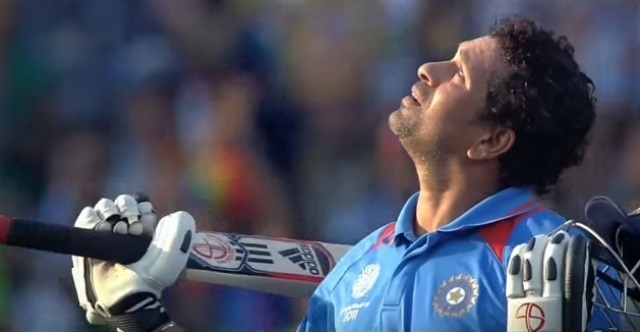
Sachin Tendulkar, like the country unanimously asserts, is less of a sportsman, and more of an emotion. Every member of a typical Indian family – be the cricket-fanatic son, the passive daughter, the workaholic father to the indifferent mother and clueless grandparents had a taste of Tendulkar. It wasn’t really a choice. You had to acknowledge when Tendulkar was on crease. India might have had magnificent players before and after him. Yet, the magnetism he had on common man was palpable. Now that the Bharat Ratna awardee strikes again with his life story Sachin: A Billion Dreams on celluloid, we have no reason to skip it. This feels more like a fresh innings, years after he retired.
Like most Indian biopics, Sachin: A Billion Dreams, too, comes under the hagiography category – if we are allowed to call it one. It is a familiar story, given Tendulkar is one of the nation’s most revered and followed personalities. There aren’t too many unheard (read positive) facts and details of his personal life that we are not already aware of. Perhaps knowing that, the makers decided to adapt the story in a docu-drama format. There are certain segments – like the childhood portions – that are re-visualized with professional actors. Not taking away much from what they are trying to say, James Erskine structures the story in an interesting non-linear narrative.
Sachin: A Billion Dreams comfortably steers clear of controversies. It is not as if Sachin had any less in his career. They briefly address his failed captaincy and his silence during the infamous match-fixing incident involving the likes of Mohammed Azharuddin and Ajay Jadeja. There’s also a mention of his assumed rivarly with Azhar, given both were up-and-coming stalwarts in the 1990s. The only person who gets some sort of an on-the-face criticism is ex-coach for Team India, Greg Chappell. It would be interesting to know Chapell’s take on the team’s collective displeasure in his tactics – that eventually led to India’s ouster from 2007 World Cup pre-lims with an embarrassing defeat to Sri Lanka.
We also get a tiny glimpse of Tendulkar’s personal life, a filmy love story with Dr. Anjali that transpired to a successful matrimony. There are video snippets of Tendulkar spending time with his children and some emotional moments wherein he remembers his father, the late Ramesh Tendulkar. The film ends on a high note of India’s world cup victory, Sachin’s subsequent benchmark of 100 international centuries and the retirement that followed. As the film rightfully suggests, Tendulkar hanging his boots (or bat?) was nothing short of a national furore. However, his fans and the whole of India might vouch that the time was perfect for him to call it quits – on a high note, with everyone’s respect and regards in place.
Interestingly though, Sachin: A Billion Dreams abounds in massive footage from test matches as opposed to one-day tournaments – that would have been of better recall value to a lot of irregular cricket viewers. The film brings in a lot of veterans from various fields speaking about Sachin and his tenacity. The most interesting bytes come from Kapil Dev, Harsha Bhogle, Virat Kohli, Virendra Sehwag, besides Sachin’s own kith and kin. As for Tendulkar, he has grown more confident in front of the camera, especially while flaunting that full-toothed smile. He delivers his lines with a remarkable tenor in his voice and is suitably expressive for the film and it’s genre. Anjali Tendulkar seems equally confident and her diction almost resembles a professional dubbing artiste’s (or was it really one?). Arjun Tendulkar, somehow, seemed disinterested in the brief segment that he appeared in.
Sachin: A Billion Dreams is quite well conceptualized and directed, for the fact that it presents a familiar story. James Erskine’s frames do amaze us in intermittent spaces where he gets to experiment – notably the childhood and present day portions. With slick editing (Avdhesh Mohla) and a classy soundtrack (AR Rahman), Sachin: A Billion Dreams is something we would watch even if it aired on prime time television. Part of it could be attributed to Sachin’s goodwill and the rest to Erskine’s confident direction allowing a common viewer identify with a lot of things, including the cricketer’s Marathi roots. The beautiful poem ‘Prajakta’ by Ramesh Tendulkar is easily the icing on the cake.

